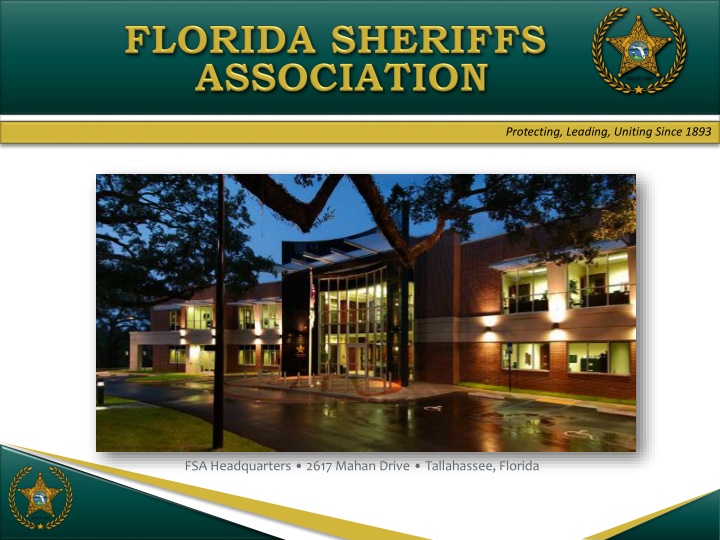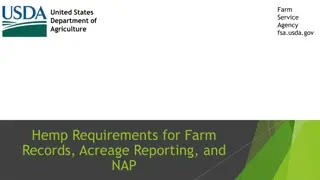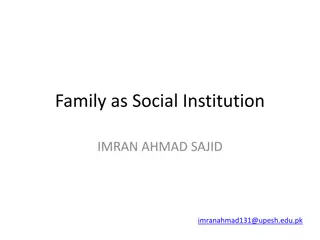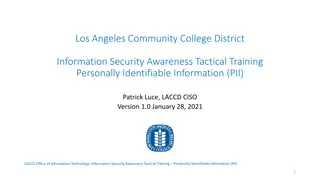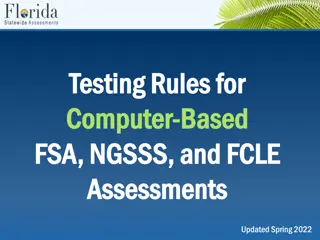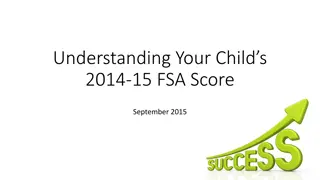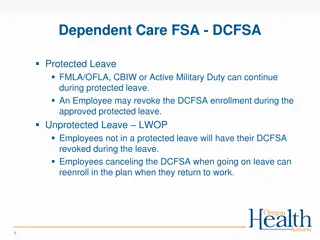Protecting, Leading, Uniting Since 1893 - FSA Overview and Guidelines
Focused on the theme of protecting, leading, and uniting since 1893, this content delves into the eligibility criteria, employee notice requirements, and employer obligations related to the Family and Medical Leave Act (FMLA). It provides insights on employee eligibility, exclusion criteria, notice requirements, and the importance of clear communication between employees and employers regarding FMLA-qualifying reasons.
Download Presentation

Please find below an Image/Link to download the presentation.
The content on the website is provided AS IS for your information and personal use only. It may not be sold, licensed, or shared on other websites without obtaining consent from the author.If you encounter any issues during the download, it is possible that the publisher has removed the file from their server.
You are allowed to download the files provided on this website for personal or commercial use, subject to the condition that they are used lawfully. All files are the property of their respective owners.
The content on the website is provided AS IS for your information and personal use only. It may not be sold, licensed, or shared on other websites without obtaining consent from the author.
E N D
Presentation Transcript
Protecting, Leading, Uniting Since 1893 FSA Headquarters 2617 Mahan Drive Tallahassee, Florida
Protecting, Leading, Uniting Since 1893 FSA EXECUTIVE LEADERSHIP CONFERENCE FSA EXECUTIVE LEADERSHIP CONFERENCE April 8, 2015 AMERICANS WITH DISABILITIES ACT/FAMILY AND MEDICAL LEAVE ACT OVERVIEW Wayne Evans General Counsel, FSA Allen, Norton & Blue, P.A. 850-561-3503 revans@anblaw.com
Protecting, Leading, Uniting Since 1893 Eligibility Eligibility 29 C.F.R. 825.110(b) Eligible Employee 12 Months of employment need not be consecutive, provided break in service doesn t exceed 7 years, unless break in service occasioned by Nat l Guard or reserve military service obligation; or written agreement exists re: intent to rehire after break, e.g., break for education or childbearing.
Protecting, Leading, Uniting Since 1893 Eligible Employee FMLA excludes employees if agency employs less than 50 and total number of employees, within a 75 mile radius of worksite is less than 50. 29 U.S.C. 2611(2)(b)(ii); Tilley v. Kalamazoo Cnty. Rd. Comm n, 2015 WL 304190 (6th Cir. 2015)
Protecting, Leading, Uniting Since 1893 Employee Notice Requirements 29 C.F.R. , 825.303(b) When employee seeks leave under FMLA for first time for FMLA- qualifying reason, employee need not assert rights under FMLA. Employee must provide sufficient information to determine if FMLA applies.
Protecting, Leading, Uniting Since 1893 Employer Notice Requirements 29 C.F.R. 825.303(b) When employer acquires knowledge of FMLA qualifying reason employer must notify employee within 5 business days. Fitness for duty requirements and job description should be provided.
Protecting, Leading, Uniting Since 1893 Employee Notice Requirements 29 C.F.R. 825.303(b) When employee seeks leave for qualifying reason for which FMLA leave has been provided, the employee must specifically reference qualifying reason or need for FMLA leave. Calling in sick is insufficient.
Protecting, Leading, Uniting Since 1893 Qualifying Reasons for Leave 29 C.F.R. 825.112 Employers covered by FMLA are required to grant leave to eligible employees. Employees do not have the right to decline FMLA leave.
Protecting, Leading, Uniting Since 1893 The Family and Medical Leave Act Accrued Leave 29 C.F.R. 825.100 Eligible employees are allowed 12 weeks of unpaid, job-protected leave, and employees may substitute accrued leave. Sheriff may, but is not required, to separate upon expiration of leave if employee is unfit for duty.
Protecting, Leading, Uniting Since 1893 Interference 29 U.S.C. 2615(a)(1) Employers burden or deny substantive statutory rights, e.g., leave. Retaliation 29 U.S.C. 2615(a)(2) Discharge of employee for exercising FMLA right to leave.
Protecting, Leading, Uniting Since 1893 No FMLA violation when wheels of termination were put in motion before request for leave. Beno v. United Telephone Co. of Fla., 969 F.Supp. 723, 726 (M.D. Fla. 1997); see also Pashoian v. GTE Directories, 208 F.Supp.2d 1293 (M.D. Fla. 2002)
Protecting, Leading, Uniting Since 1893 Absenteeism 42 U.S. C. 12112(a) Disability: Physical or mental impairment that substantially limits a major life activity; record of such impairment; or regarded as having an actual or perceived disability. Chronic absenteeism is not protected under ADA.
Protecting, Leading, Uniting Since 1893 Perception of Disability 42 U.S.C. 12112(a); 29 C.F.R. 16302(g) Agency prohibited from taking action against employee because of an actual or perceived disability. Treat performance issues without regard to medical issues unless raised by employee.
Protecting, Leading, Uniting Since 1893 Birth of a Child 29 C.F.R. 825,120, 825.202 Unless employer agrees, employee can t take bonding leave intermittently Employee must take bonding leave in a continuous block of time
Protecting, Leading, Uniting Since 1893 Accommodation Moving one employee to permanent day shift placed heavier burden on the rest of plant operators when only rotating shifts available. Turco v. Hoechst Celanese Corp., 101 F.3d 1090, 1094 (5th Cir. 1997)
Protecting, Leading, Uniting Since 1893 Accommodation ADA doesn t require essential job functions to be eliminated or the City to continue to accommodate disability with respect to investigation of crime scene- previous accommodation exceeded what the law requires. Holbrook v. City of Alpharetta, Ga, 112 F.3d 1522, 1526-27 (11th Cir. 1997)
Protecting, Leading, Uniting Since 1893 440.15(11), Fla. Stat. Law enforcement officer who in the line of duty is maliciously or intentionally injured shall be carried in full-pay status. Deputy is not required to use leave to supplement W.C. benefit of 2/3 of salary.
Protecting, Leading, Uniting Since 1893 Workers comp., leave, and FMLA may run concurrently. 29 C.F.R. 825.207(e)- Serious health condition may result from injury on or off duty. Paid leave may supplement W.C. benefits (eg. 2/3 salary).
Protecting, Leading, Uniting Since 1893 Retaliation 440.205 Fla. Stat. doesn t prohibit discharge of employee for any non-retaliatory reason once W.C. claim has been filed. Pierich v. Climatrol, Inc., 523 So.2d 684, 685 (Fla. 3d DCA 1988).
Protecting, Leading, Uniting Since 1893 Employer has the obligation to obtain physician s reports and cannot require employee to assume this duty. 440.13(4)(a),(c), Fla. Stat.; Hornfischer v. Manatee County Sheriff s Office, 136 So. 3d. 703 (Fla. 2d DCA, 2014).
